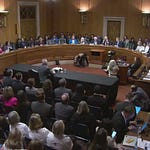Table of Contents:
Federal Register Vol. 89, No. 189 (September 30, 2024)
I. Department of Transportation, Federal Aviation Administration
A. Airworthiness Directives
DG Aviation GmbH (Type Certificate Previously Held by DG Flugzeugbau GmbH) Gliders: This section introduces a new airworthiness directive for certain DG Aviation gliders due to a reported broken elevator pushrod. It summarizes the affected models, the required corrective actions (maintenance manual revisions, operational checks, part replacement), and provides contact information for DG Aviation GmbH.
Airbus SAS Airplanes: This section details an airworthiness directive for certain Airbus airplanes. It defines the affected parts, explains the unsafe condition (power module failure at low temperatures), and outlines the corrective actions, which involve contacting Airbus for instructions to return the affected part.
B. Takes of Marine Mammals Incidental to Specified Activities; Taking Marine Mammals Incidental to Hilcorp Alaska, LLC Production Drilling Support in Cook Inlet, Alaska:
Summary of Request: This section summarizes Hilcorp's request for an Incidental Harassment Authorization (IHA) for taking marine mammals during production drilling support activities in Cook Inlet, Alaska. It highlights that the request covers 12 marine mammal species and focuses on Level B harassment (behavioral disturbance) due to noise from tugboats.
Description of Specified Activity: This section describes Hilcorp's planned activities, which involve using tugboats to tow and position a jack-up rig for production drilling at existing platforms in Cook Inlet. It emphasizes that the noise generated by the tugs, particularly during towing operations, is the primary source of potential impact on marine mammals.
Mitigation: This section outlines the mitigation measures Hilcorp will implement to minimize potential impacts on marine mammals. Key measures include conducting towing operations during favorable tidal conditions to reduce tugboat power and noise levels, using bow thrusters only when necessary, and implementing clearance zones to avoid disturbing marine mammals.
Negligible Impact Analysis and Determinations: This section presents the analysis and determination of negligible impact for the specified activity. It discusses the potential effects of Hilcorp’s activities on marine mammals, including the type and magnitude of potential impacts (primarily Level B harassment), the status of the affected marine mammal stocks, and the anticipated duration of the activities.
II. Environmental Protection Agency
A. Air Quality Designation; Proposed Decision for the 2015 Ozone National Ambient Air Quality Standards; Corpus Christi-Kingsville-Alice, TX: This section announces the EPA’s proposed decision on the air quality designation for the Corpus Christi-Kingsville-Alice, TX, area regarding the 2015 Ozone National Ambient Air Quality Standards. The EPA is proposing to designate the area as “nonattainment” due to violations of the ozone standard.
B. Hazardous Waste Management System: Authorization of State Program; West Virginia: This section announces the EPA’s final decision to authorize changes to the state of West Virginia's hazardous waste management program, ensuring it remains consistent with federal regulations and adequately protects human health and the environment. The specific changes to the state regulations, including additions, removals, and revisions, are presented in tables to clearly highlight the authorized modifications.
C. Airworthiness Directives; Proposed Rules: This section outlines proposed changes to regulations for evaluating and designating air monitoring methods used by state agencies to demonstrate compliance with National Ambient Air Quality Standards (NAAQS). Key changes include requirements for manufacturers to maintain records of purchasers for specific monitoring equipment, particularly for fine and coarse particulate matter (PM2.5 and PM10).
III. Department of Commerce, National Oceanic and Atmospheric Administration
A. Fisheries of the Northeastern United States; Atlantic Spiny Dogfish Fishery; Final 2024 Specifications: This section announces the final adjusted specifications for the Atlantic spiny dogfish fishery for fishing year 2024. It includes a table outlining the catch limits and other relevant details for the fishery, such as the Acceptable Biological Catch (ABC), Annual Catch Limit (ACL), and commercial quota.
B. Fisheries of the Economic Exclusive Zone Off Alaska; Pollock Fishing by Vessels Using Trawl Gear in the Central Regulatory Area of the Gulf of Alaska: This section announces a temporary rule closure for pollock fishing in the Central Regulatory Area of the Gulf of Alaska for vessels using trawl gear. It addresses concerns over exceeding the allowable catch limit and aims to prevent overfishing of the pollock stock.
C. Fisheries of the Exclusive Economic Zone Off Alaska; Reallocation of Pacific Cod in the Bering Sea and Aleutian Islands Management Area: This section announces a temporary rule to reallocate the projected unused amount of Pacific cod from certain fishing vessels in the Bering Sea and Aleutian Islands Management Area. The reallocation aims to benefit smaller catcher vessels using hook-and-line or pot gear while ensuring the sustainable harvest of Pacific cod.
D. Magnuson-Stevens Fishery Conservation and Management Act; Notice of Availability of a Fishery Management Plan Amendment for Public Comment: This section provides a notice of availability for public comment on a Fishery Management Plan amendment. The amendment addresses fishing gear regulations in Federal waters around Puerto Rico and the U.S. Virgin Islands. It focuses on gillnets, prohibiting their use in certain areas and establishing specific requirements for their use in others, with the aim of mitigating negative ecological impacts. It also discusses economic considerations related to the amendment, particularly its potential effects on small commercial fishing businesses.
IV. Other Notable Sections
A. National Credit Union Administration
1. Prompt Corrective Action; Definitions: This section defines key terms, including "conviction," related to individuals with criminal histories seeking positions in credit unions, clarifying the eligibility criteria for those individuals.
2. Prompt Corrective Action; Prohibition on Individuals Convicted of Certain Criminal Offenses: This section explains the criteria for individuals with certain criminal convictions seeking employment at credit unions, aiming to maintain the integrity and safety of these financial institutions.
B. United States Postal Service: This section announces revisions to the Mailing Standards of the United States Postal Service, Domestic Mail Manual (DMM) concerning commercial letters, cards, flats, and parcels. These revisions likely involve updates to regulations, requirements, or procedures for sending commercial mail items.
C. International Trade Administration: This section presents notices related to antidumping and countervailing duty investigations, particularly focusing on optical brightening agents.
D. Department of Energy: This section outlines energy conservation standards for medium-sized refrigerated product storage walk-in coolers (MREFS). It specifies maximum allowable energy consumption based on various cooler types and sizes.
E. Department of the Treasury, Internal Revenue Service: This section provides notices concerning agency information collection activities, including those related to suspected tax law violations.
F. Federal Reserve System: This section announces changes in bank control notices and acquisitions of shares in banks or bank holding companies, providing transparency for activities within the Federal Reserve System. It lists specific individuals and entities involved in these financial transactions.
G. Federal Trade Commission: This section details the system of records for identity theft victims and outlines how the FTC collects, maintains, and uses this information to investigate and address identity theft cases.
H. Food and Drug Administration: This section lists various advisory committees within the FDA, including their areas of expertise and consumer representative vacancies, highlighting opportunities for public participation in these committees.
I. Department of Transportation: This section outlines the system of records for Disadvantaged Business Enterprise (DBE) program participants. It explains how the Department of Transportation collects, maintains, and uses this data to promote participation of DBEs in transportation-related contracts.
J. Department of Agriculture: This section announces the final rule amending regulations for Rural Business-Cooperative Service, Rural Housing Service, and Rural Utilities Service programs. Key changes include revised definitions of "rural area" to expand eligibility for certain USDA programs, particularly for areas near larger cities.
This table of contents provides a comprehensive overview of the key topics and regulations covered in this volume of the Federal Register.
Potential Inefficiencies and Wasteful Spending in the Federal Register
The provided Federal Register excerpts offer limited insight into specific instances of potential inefficiencies and wasteful spending. The documents primarily focus on regulatory actions, notices, and proposals, often lacking detailed financial breakdowns or cost-benefit analyses. However, some areas warrant attention for potential inefficiencies:
Duplication of Information Collection: The Federal Register reveals multiple agencies seeking public comment on various topics. For example, the FDA seeks feedback on veterinary drug testing, the Fish and Wildlife Service on trout angler valuations, and the CDC on changes to its VAERS website. While each initiative may have merit, the sheer volume of information requests across government agencies raises concerns about potential duplication and the burden placed on the public to respond to numerous requests. [1-14] This is similar to the observation in our conversation history about the potential inefficiencies arising from multiple agencies seeking public comments, but the sources do not offer concrete evidence of duplicated efforts.
Buy America Waiver: The Federal Highway Administration's (FHWA) decision to grant a Buy America waiver to the Illinois Department of Transportation (IDOT) for submersible pumps, despite the requirement for domestic manufacturing, raises questions about the waiver process. [15] The FHWA cites the lack of domestic production in "sufficient and reasonably available quantities," but the justification lacks specific details on efforts to source domestically.
Administrative Costs of Regulations: Numerous regulations, while well-intentioned, impose administrative burdens on businesses and individuals. For instance, the National Credit Union Administration's final rule amending regulations for credit unions includes requirements for background checks on employees, even for minor or dated offenses. [16, 17] This requirement necessitates applications for consent from the NCUA, potentially leading to delays in hiring and increased administrative costs for both credit unions and the NCUA.
It's important to acknowledge that the absence of explicit mentions of inefficiencies or wasteful spending in the provided excerpts doesn't necessarily mean they don't exist. A thorough analysis would require access to comprehensive financial data, agency budgets, and program evaluations.
Urgent and High-Impact Items in the Federal Register Excerpts
The provided Federal Register excerpts contain several notices and rules with deadlines for public comment or implementation. These items often carry significant implications for the affected industries and, in some cases, the general public. Here's a summary of those urgent and high-impact items:
Disaster Declarations and Assistance:The Small Business Administration (SBA) announces a disaster declaration for Connecticut (FEMA-4820-DR) due to a major disaster event on September 20, 2024. This declaration opens up opportunities for businesses and residents to apply for disaster loans. The deadline for physical loan applications is November 19, 2024, while the deadline for Economic Injury Disaster Loan (EIDL) applications is June 20, 2025. [1]
Fisheries Management:The National Marine Fisheries Service (NMFS) issues an emergency action extending the 2024 emergency specifications for the spiny dogfish fishery through April 30, 2025. This action aims to prevent overfishing while minimizing economic impacts on fishing communities. The effective date for this extension is November 18, 2024. [2]
NMFS also announces final specifications for the Pacific cod fishery in the Gulf of Alaska, adjusting the total allowable catch for vessels using jig gear. This action, effective immediately, is based on the most recent fisheries data and aims to prevent overfishing. [3]
Public Comment Periods:The FDA is soliciting public comment on four final device-specific guidance documents for the Safety and Performance Based Pathway. These documents pertain to dental handpieces, air motors, dental ceramics, dental impression materials, and dental cements. The announcement is published on September 30, 2024, and while no specific deadline for comments is mentioned, it is generally advisable to submit comments as early as possible. [4]
The FDA is also seeking feedback on a draft guidance for industry related to genotoxicity testing for veterinary drug residues in human food. This draft guidance, developed by the International Cooperation on Harmonisation of Technical Requirements for Registration of Veterinary Medicinal Products (VICH), aims to harmonize genotoxicity testing requirements internationally. The deadline for submitting comments is November 29, 2024. [5]
The Centers for Disease Control and Prevention (CDC) is requesting public comment on proposed changes to its Vaccine Adverse Event Reporting System (VAERS) website. The CDC seeks to enhance the website's functionality and usability. The docket for written comments will be open from October 4-18, 2024. [6]
The Federal Highway Administration (FHWA) is seeking comments on its decision to grant a Buy America waiver to the Illinois Department of Transportation (IDOT). The waiver pertains to the procurement of submersible pumps with non-domestic iron and steel components. While the waiver is effective October 1, 2024, the FHWA is soliciting feedback on its decision. [7]
These urgent and high-impact items highlight the dynamic nature of the Federal Register and the importance of staying informed about regulatory changes and opportunities for public engagement.
Regulations Affecting Average Americans: Insights from the Federal Register
The provided excerpts from the Federal Register (September 30, 2024) offer a glimpse into government regulations and activities. While not directly focused on the average American, some regulations could be perceived as obscure, onerous, or examples of government intrusion. Here are some key examples:
Financial Regulations:The Bureau of Consumer Financial Protection proposes new rules for "Remittance Transfers Under the Electronic Fund Transfer Act." These rules, concerning money transfers, particularly impact individuals sending money internationally. [1] The proposed changes to model disclosures, while aiming for transparency, add complexity to an already intricate process. [2, 3]
The National Credit Union Administration (NCUA) introduces a final rule amending regulations for credit unions, including requirements for background checks on employees and share insurance coverage. [4-20] These regulations, while intended to safeguard the financial system, impose constraints on credit unions and potentially affect hiring practices. [6, 9] For example, credit unions are required to conduct background checks even for individuals with minor or dated offenses that may not pose a risk, necessitating applications for consent from the NCUA. [5, 8]
Aviation Safety:The Federal Aviation Administration (FAA) issues several Airworthiness Directives (AD) addressing safety concerns in various aircraft models. [21-28] While crucial for aviation safety, these ADs translate to mandatory inspections, maintenance, and potential part replacements for aircraft operators, resulting in significant costs. [22, 25, 27]
Environmental Regulations:The Fish and Wildlife Service proposes a new information collection initiative to "Improve Our Understanding of How Trout Anglers Differ in Their Valuations Between Wild and Hatchery Trout." [29, 30] This initiative, requiring surveys of licensed anglers, raises potential concerns about government overreach into recreational fishing, particularly if it leads to further restrictions or regulations.
Postal Service:The Postal Regulatory Commission proposes amendments to its rules concerning rate incentives for Market Dominant products, including changes to filing and reporting requirements. [31, 32] While seemingly technical, these changes could impact businesses relying on specific postal services, potentially leading to increased costs.
It's important to note that the provided excerpts represent only a fraction of government activities detailed in the complete Federal Register. To gain a more comprehensive understanding of regulations affecting average Americans, it's essential to examine the full scope of regulatory actions.













Share this post